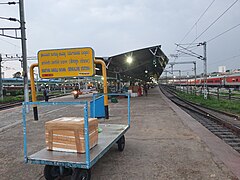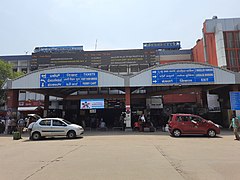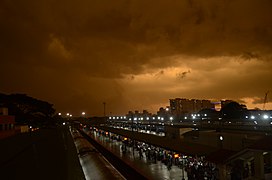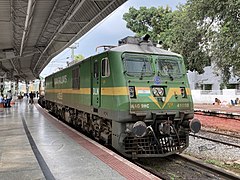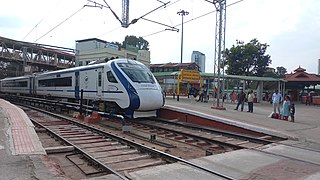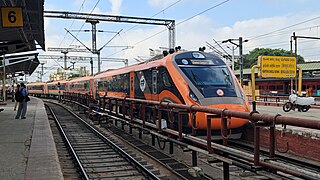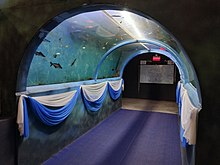Bangalore City railway station
 From Wikipedia - Reading time: 13 min
From Wikipedia - Reading time: 13 min
Bangalore City Krantivira Sangolli Rayanna Bengaluru Station Krāntivīra Saṅgoḷḷi Rāyaṇṇa (Beṅgaḷūru Nildāṇa) | |||||||||
|---|---|---|---|---|---|---|---|---|---|
 Main entrance of Bangalore City Railway Station | |||||||||
| General information | |||||||||
| Other names | KSR Bengaluru, Bengaluru City | ||||||||
| Location | Gubbi Thotadappa Road, M.G. Railway Colony, Majestic Bangalore, Karnataka, 560023 | ||||||||
| Coordinates | 12°58′42″N 77°34′10″E / 12.97833°N 77.56944°E | ||||||||
| Elevation | 920 metres (3,020 ft) | ||||||||
| Owned by | Indian Railways | ||||||||
| Operated by | South Western Railway zone of Indian Railways | ||||||||
| Line(s) | Bangalore–Hubli Bangalore–Chennai Bangalore–Mysore Bangalore–Guntakal Bangalore–Hassan Bangalore–dharmapuri-Salem | ||||||||
| Platforms | 10 | ||||||||
| Tracks | 15 | ||||||||
| Connections | |||||||||
| Construction | |||||||||
| Structure type | At–ground | ||||||||
| Parking | Available | ||||||||
| Accessible | |||||||||
| Other information | |||||||||
| Status | Functioning | ||||||||
| Station code | SBC | ||||||||
| Zone(s) | South Western Railway zone | ||||||||
| Division(s) | Bangalore | ||||||||
| History | |||||||||
| Opened | 1968 | ||||||||
| Electrified | Yes | ||||||||
| Previous names |
| ||||||||
| Passengers | |||||||||
| 10,00,000/day | |||||||||
| |||||||||
Bangalore City Railway Station, officially Krantivira Sangolli Rayanna Bengaluru Station , commonly known as KSR Bengaluru Station, Bengaluru City Railway Station or Majestic Railway station[1] (station code: SBC[2]), is the main railway station serving the city of Bangalore, Karnataka, India. It is the busiest railway station in South Western Railway zone of Indian Railways, and is the only station classified under NSG1 category in the zone.[3]
It is located across the Kempegowda Bus Station. The station has 10 platforms and three entrances.[4]
History
[edit]The establishment of the British cantonment in 1809 made Bangalore a crucial military hub in South India. Soon enough, a need arose to establish more transportation links between the new civil and military outpost with the colonial administrative headquarters in Madras. In the 1840s, proposals for these railway lines were debated in the British Parliament, a move supported by traders and shipping companies. In Bangalore, Sir Mark Cubbon pushed for the development of the railway link during his tenure as the Commissioner of Mysore and Coorg. He proposed a railroad project connecting Mysore and Madras through Bangalore and Calicut but the plan was stalled. The line was initially meant for military purposes -for transporting soldiers, grains and ammunition but was later made open to the public. Lewin Bentham Bowring took over as the commissioner of Mysore and the land for the railway project was donated by the Mysore government. The train that chugged from Cantonment was called 'Bangalore Mail'. The year 1864 also saw other crucial developments in Bangalore. The railway link was a turning point in the history of the city as it encouraged immigration from the rest of the country. Trade witnessed a huge boost, and many potters from Madras also settled down in the Cantonment around the same time, leading to the establishment of Pottery Town.[5]
In 1944, the rail network was nationalised. On 14 April 1951, the three major networks administered by the erstwhile Madras and Southern Maratha Railway, the Southern Indian Railway and Mysore State Railway were joined to form Southern Railway.
Due to historical reasons, the headquarters of the erstwhile Mysore State Railway was located in Mysore though Bangalore was the hub of operations. To improve administration and enhance monitoring, Bangalore Division was inaugurated on 27 July 1981.[6]
The metre-gauge lines bound to Hubli, Mysore were converted into broad gauge in the 1990s.
In 2015 it was decided to rename the station; three stations in the city were using Bangaluru in their name.[7] The station was renamed Krantiveera Sangolli Rayanna station in 2016.[8] The station has numerous licensed food stalls,[9] modernised digital lockers,[10] facilities for the disabled,[11][12] and child-friendly spaces which will also accommodate trafficked children.[13]
Platforms
[edit]
Platforms 1 to 7 connects to the Chennai and Salem railway lines. On platforms 8 to 10, service trains arrive via Yeshwantpur from Hubli-Dharwad. Platforms 1 to 4 terminate at Bangalore. On platforms 5 to 10, service trains depart towards Mysore. There are railway lines between Platforms 4 and 5 that are used as the railway yard. There are 5 railway lines passing from Bangalore City railway station – to Hyderabad via Guntakal, Chennai via Krishnarajapuram, Salem via Dharmapuri, Mysore, Hubli-Dharwad via Tumkur, Birur. The Bangalore–Chennai railway line via Bangalore Cantonment, Bangarpet, is fully electrified and open for traffic. The Bangalore–Mysore line has also been doubled and electrified.
Connections
[edit]The railway station is served by City Railway Station metro station on the Namma Metro's Purple Line, which opened on 30 April 2016. Later that year, the Bangalore Metro Rail Corporation Limited (BMRCL) decided to construct a foot overbridge from the metro station until the boundary of the railway station, while the South Western Railway, would complete the rest of the work.[14][15] The foot overbridge connecting platform 10 with the metro station was opened on 18 February 2019. The BMRC reported that monthly ridership at the metro station was 175,000 passengers per day prior to opening the bridge, and increased to 250,000 two months after its opening.[16]
The railway station is also served by Kempegowda Bus Station.
Gallery
[edit]Thes are some of the pictures that represent this railway station:-
-
Platform 5 of this railway station
-
Bangalore City station water fountain
-
Departure hall of the railway station
-
Rainy night at the railway station
Few photos of Vande Bharat Express trains around this railway station:-
-
Vande Bharat Express departing towards Chennai Central
-
Vande Bharat Express on standy at KSR Bengaluru City Jn
-
Mini Saffron-Grey Vande Bharat Express arriving from Mysuru Junction
-
Vande Bharat Express standing on Platform 7
-
Mini Vande Bharat Express ready for departure towards Dharwad
-
Malgudi Express entering KSR Bengaluru
-
Tumakuru KSR Bengaluru Tumakuru Passenger 56222-56225 (06576-06575) at PF-9 and Malgudi Express entering KSR Bengaluru to PF-10
Important trains
[edit]The important trains originating and passing from Bangalore city station are KSR Bengaluru Mail, Kacheguda-Mysuru Express, Karnataka Express, Bangalore Sangli Rani Chennamma Express,KSR Bengaluru-Kannur Express,Island Express, Chennai Shatabdi Express, Rajdhani Express, Lal Bagh Express, Chennai-Mysuru Vande Bharat Express, Mysuru Junction–MGR Chennai Central Vande Bharat Express, Uday Express, Brindavan Express and Wodeyar Express, Humsafar Express, Duronto Express.
Aquatic Kingdom
[edit]The station features a public aquarium called ′Aquatic Kingdom′ which has been functional since 1 July 2021.[17][18] It includes a 12-foot-long tunnel aquarium,[19] which is India's first.[20][21] It is developed in collaboration with HNI Aquatic Kingdom.[19]
See also
[edit]References
[edit]- ^ "South Central Railway Press Release". South Central Railway zone. 3 February 2016. Archived from the original on 2 October 2018. Retrieved 13 October 2016.
- ^ "Station Code Index" (PDF). Portal of Indian Railways. 2015. p. 46. Archived (PDF) from the original on 22 June 2017. Retrieved 29 April 2019.
- ^ "South Western Railway". swr.indianrailways.gov.in. Retrieved 26 April 2023.
- ^ "Third entry for KSR station in Bengaluru opened". The New Indian Express. 29 June 2019. Retrieved 14 August 2022.
- ^ Shekhar, Divya (3 August 2017). "Date with History: In 1864, first train chugged from Cantonment to Jolarpettai". The Economic Times. Archived from the original on 13 November 2020. Retrieved 19 August 2020.
- ^ Phadnis, Renuka (2 August 2014). "Bangalore's rail connectivity turns 150 years". The Hindu. ISSN 0971-751X. Archived from the original on 18 October 2021. Retrieved 19 August 2020.
- ^ Ray, Aparajita (5 November 2015). "Bengaluru city station to be renamed as Kranthiveera Sangolli Rayanna soon". The Times of India. Retrieved 14 August 2022.
- ^ "Bengaluru Railway station renamed as Krantiveera Sangolli Rayanna station". The New Indian Express. 15 May 2016. Retrieved 14 August 2022.
- ^ "KSR railway station gets five-star rating for food quality, hygiene". The Hindu. 26 July 2022. ISSN 0971-751X. Retrieved 14 August 2022.
- ^ "Digital, smart cloakrooms operational at two railway stations in Bengaluru". The Indian Express. 4 July 2022. Retrieved 14 August 2022.
- ^ "Ksr B'luru Station Adds Features To Become Disabled Friendly". The Times of India. 25 March 2022. Retrieved 14 August 2022.
- ^ Lalitha, S (14 February 2022). "Four railway stations in Bengaluru Division set to become disabled-friendly". The New Indian Express. Retrieved 14 August 2022.
- ^ Lalitha, S (8 April 2022). "Exclusive child-friendly space takes shape in Bengaluru's KSR railway station". The New Indian Express. Retrieved 14 August 2022.
- ^ "Wait for FOB to City Railway Station gets longer". The Hindu. 7 February 2017. Archived from the original on 7 February 2017. Retrieved 2 February 2021.
- ^ "Wait for metro-city railway station bridge gets longer". The Hindu. 9 February 2017. Archived from the original on 18 October 2021. Retrieved 2 February 2021.
- ^ Kulkarni, Chiranjeevi (2 May 2019). "Bridge linking boosts Bengaluru metro ridership". Deccan Herald. Archived from the original on 4 May 2019. Retrieved 4 May 2019.
- ^ "Aquarium a new delight at KSR Bengaluru railway station". The Times of India. TNN. 2 July 2021. Archived from the original on 2 October 2021. Retrieved 2 October 2021.
- ^ "Indian Railways' to get a movable freshwater tunnel aquarium at KSR Bengaluru station - Freshwater tunnel aquarium". The Economic Times. Archived from the original on 2 October 2021. Retrieved 2 October 2021.
- ^ a b "12-Feet-Long Tunnel Aquarium Opens At Bengaluru Railway Station". NDTV.com. NDTV. Archived from the original on 2 October 2021. Retrieved 2 October 2021.
- ^ "India's first movable tunnel aquarium opens at Bengaluru railway station". The News Minute. India: The News Minute. 3 July 2021. Archived from the original on 3 July 2021. Retrieved 18 October 2021.
- ^ PTI, BS Web Team & (2 July 2021). "In pictures: Indian Railways' first movable freshwater tunnel aquarium". Business Standard India. India: Business Standard. Archived from the original on 2 July 2021. Retrieved 18 October 2021.
External links
[edit]- Bangalore City railway station at the India Rail Info
 KSF
KSF

